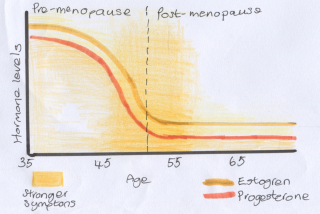Menopause and the Workplace – World Menopause Day
Approximately two-thirds of women in the UK feel there is a general lack of support and understanding around menopause and the various transition stages of women's life (Nuffield Health). With 80% of women going through menopause experiencing some symptoms - that's 1.5 million women in the UK affected at any one time (Sarah Rayner – Making Friends with the Menopause)
'Menopause has increased my anxiety and lack of memory, and I find it harder to make decisions,' says Janet, a member of Making Friends with the Menopause on Facebook.
What is Menopause?
It is still a taboo topic for some, many people think menopause is a disease with clinical symptoms that need treatment but its a normal life transition, a natural part of ageing that usually occurs between 45 and 55 years of age, as a woman's oestrogen levels decline. However, with recent discussions happening in Parliament around women's rights during menopause and the recent changes to add it to the school curriculum, it will hopefully become part of conversations in future healthcare and biology classes.
'You can think of experiencing the Menopause as ceasing periods, saying goodbye to fertility and time for a new sense of meaning and purpose in life.' -Sarah Raynor
Can the Menopause have an impact on relationships, work, and home life?
It is more helpful to see Menopause as rich in both positive and negative meanings. In the UK, the average age for a woman to reach menopause is 51. Periods usually start to become less frequent over a few months or years before they stop altogether. Sometimes they can stop suddenly (NHS Definition). I use the term usually here as in the NHS definition but really the process is different for every woman.
Around 1 in 100 women experience menopause before 40 years of age, this is known as premature menopause or premature ovarian insufficiency. A wonderful source of information and help for premature menopause can be found at The Daisy Network, a support network for POI
To understand the Menopause it is useful to see the experience as a life journey of three stages.
- Perimenopause – A time of the ovaries winding down, hormones fluctuating and physical indicators such as hot flushes and night sweats can appear, along with hair thinning, weight gain, and loss of libido.
- Menopause – The point when a woman no longer has regular menstrual periods for at least 12 months. The ovaries stop producing eggs and physical changes noticed in the perimenopause stage can intensify.
- Postmenopause – When you have not bled for a year. For some, those physical changes start to ease but for others, they do not. Some women may only take a few months to reach the beginning of this stage, while for others it can take years of symptoms and spotting to reach this stage.
As you age, your hormone levels drop. The strongest indicators of menopause happen during the largest drop in your hormone levels.
How menopause can affect your Mental Health?
Low levels of oestrogen affect blood flow to can your cognitive functions which can result in clumsiness, brain fog, or a "woolly out of body" experience.
The lowering of progesterone can make you feel edgy, anxious, and short-tempered. Progesterone is a calming hormone, less of it and you may feel more overwhelmed and more easily stressed.
Although most women do not become clinically depressed, an estimated 20% do. Studies of mood during menopause provide evidence of the risk of becoming clinically depressed tends to be highest during perimenopause. This is also the same time in your life that your children leave home and your parents are becoming dependent on you, with so many factors happening at once you can feel under an extreme level of pressure.
In addition to the effect of lowering hormone levels leaving you edgy, hot-tempered, and anxious but one of the main symptoms of menopause after hot flushes is insomnia. Chronic fatigue in addition to other effects can quickly lead to feelings of overwhelm and long term mental health issues.
How does menopause affect being at work?
Perimenopausal and menopausal symptoms already affect a substantial number of workers. According to the Faculty of Occupational Medicine (FOM), nearly 8 out of 10 menopausal women are at work, and one in three of the UK workforce will soon be over 50, which is expected to grow considerably now retirement ages are rising to 68. Due to these factors, menopausal women are the fastest-growing demographic in the workforce.
If a worker does not get the help and support they need, it is increasingly likely that the effects of the menopause can, for example, lead to them:
- hide their symptoms as they don't wish to tell their employers
- feeling ill and taking numerous sick days to hide symptoms
- losing confidence to do their job
- don't discuss their symptoms as they will be judged less capable
- suffering from stress, anxiety, and depression
- leave their job rather than work with symptoms
ACAS has published menopause at work guidance, access the guide here: https://bit.ly/3iYaBIj
I highly recommend you view the Henpicks's menopause hub for a range of resources and extra help. They do amazing stuff and you can find out more about menopause and the workplace such as what is menopause, menopause symptoms, long-term health, managing menopause, money worries, and menopause at work. It is one of the UK's largest, fastest-growing communities for women over 40.
Other Useful Resources to look out for are :
BBC Radio 4 Woman's Hour-The Menopause series.
International Menopause Society page.
Menopause Matters Website
Menopause Support Site
NHS Employers Website
Should you require mental health support for your workforce covering menopause or for any other reason please contact me on 07542584309 or use our contact form here.
Comments
By accepting you will be accessing a service provided by a third-party external to https://www.flashinglightbulb.co.uk/




